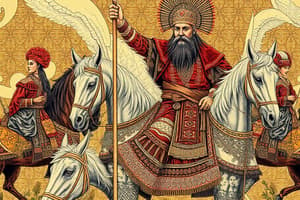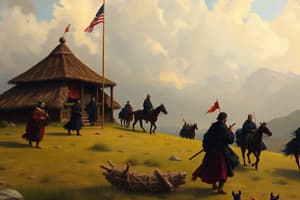Podcast
Questions and Answers
Who founded the Mongol Empire in the early 13th century?
Who founded the Mongol Empire in the early 13th century?
- Kublai Khan
- Xiongnu
- Alexander the Great
- Genghis Khan (correct)
What distinguished the Xiongnu Empire from other empires of their time?
What distinguished the Xiongnu Empire from other empires of their time?
- They were the first to establish trade routes with Europe.
- They were led by emperors who claimed divine status.
- They had a powerful navy.
- They didn't construct cities or develop writing systems. (correct)
What was one unique aspect of the Mongol Empire's governance under Genghis Khan's descendants?
What was one unique aspect of the Mongol Empire's governance under Genghis Khan's descendants?
- Strict enforcement of a single religion
- Expansion of religious freedom (correct)
- Forced assimilation of all conquered peoples
- Ban on any form of cultural exchange
Which region did the Mongol Empire stretch from to Central Europe?
Which region did the Mongol Empire stretch from to Central Europe?
What were the Mongols known for besides their military prowess?
What were the Mongols known for besides their military prowess?
How did the Xiongnu Empire connect its diverse mobile groups?
How did the Xiongnu Empire connect its diverse mobile groups?
What key characteristic of nomadic empires like the Mongol Empire challenges the traditional view of empires as static, city-based entities?
What key characteristic of nomadic empires like the Mongol Empire challenges the traditional view of empires as static, city-based entities?
What factor eventually led to the disintegration of the Mongol Empire?
What factor eventually led to the disintegration of the Mongol Empire?
What long-lasting impact did the Mongol Empire have on Eurasian history?
What long-lasting impact did the Mongol Empire have on Eurasian history?
Which characteristic enabled nomadic societies like the Mongols to establish capital cities within conquered sedentary states?
Which characteristic enabled nomadic societies like the Mongols to establish capital cities within conquered sedentary states?
How did nomadic empires like the Mongol Empire influence neighboring empires?
How did nomadic empires like the Mongol Empire influence neighboring empires?
What distinguishing feature of nomadic empires challenges the perception of empire-building as solely city-based?
What distinguishing feature of nomadic empires challenges the perception of empire-building as solely city-based?
Study Notes
Nomadic Empires: The Rise of the Mongol Empire
Nomadic empires, also known as steppe empires, have been a unique chapter in human history, encompassing the largely non-sedentary peoples of Eurasia from classical antiquity to the early modern era. Among these, the Mongol Empire stands as one of the most influential and enduring nomadic forces to have reshaped the world.
Xiongnu and the First Nomadic Empire
Before the rise of the Mongols, the Xiongnu Empire, established around 209 B.C., was Asia's first nomadic empire, herding horse-riding groups that covered large swathes of the central and northeastern steppes. Unlike other empires, they did not construct cities or develop writing systems but instead relied on a flexible political system that interconnected mobile groups with diverse backgrounds.
Genghis Khan and the Mongol Empire
The Mongol Empire, founded by Genghis Khan in the early 13th century, was the most successful and expansive nomadic empire in history. It stretched from the Korean Peninsula to Central Europe and encompassed a variety of ethnic groups, religions, and cultures. Genghis Khan's descendants, such as Kublai Khan, expanded the empire's reach and governance.
While the Mongols were known for their military prowess, they allowed for religious freedom and encouraged debate, commerce, and cultural exchanges. They also founded cities and established a writing system, indicating that nomadic societies could adapt to more settled ways of life without losing their nomadic roots.
Collapse and Influence
The Mongol Empire eventually disintegrated due to conflict between its princes and the rise of new powers, such as the Ming and Qing dynasties in China. However, its impact on Eurasian history proved long-lasting, shaping borders, languages, and the development of civilizations.
Key Characteristics of Nomadic Empires
- Horse-riding and bow-wielding societies
- Flexible political systems connecting mobile groups with diverse backgrounds
- Establishment of capital cities within conquered sedentary states
- Adaptation to settled ways of life without losing nomadic roots
- Influence on the rise and fall of neighboring empires
Nomadic empires like the Mongol Empire challenge the traditional view of empires as static, city-based entities. Instead, they represent a mobile, network-based approach to empire-building, one capable of immense scale and longevity.
Studying That Suits You
Use AI to generate personalized quizzes and flashcards to suit your learning preferences.
Description
Test your knowledge on nomadic empires, focusing on the rise and impact of the Mongol Empire from its establishment by Genghis Khan to its eventual collapse. Learn about key characteristics, historical figures, and lasting influences of these unique mobile empires.




